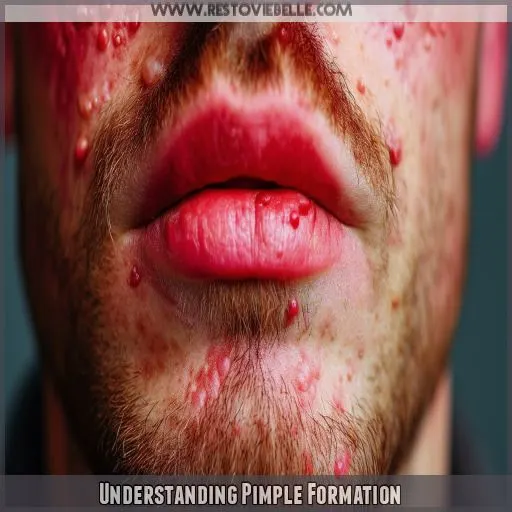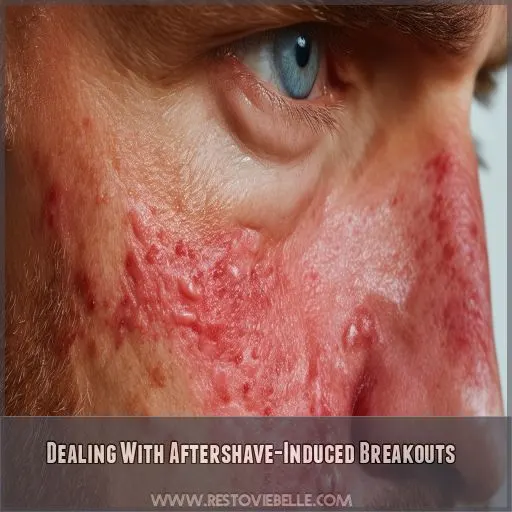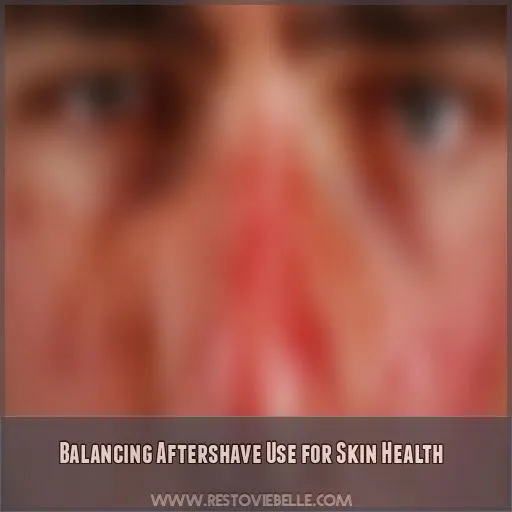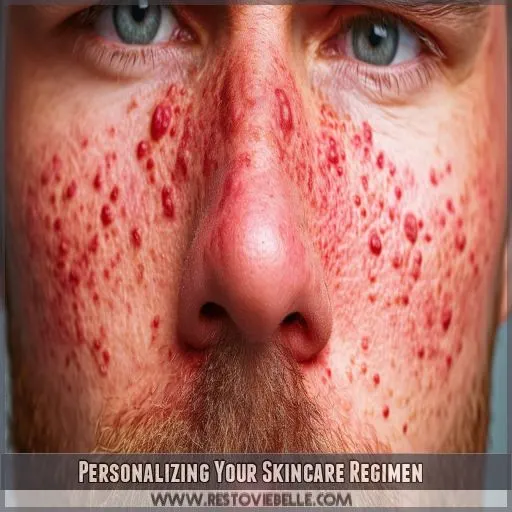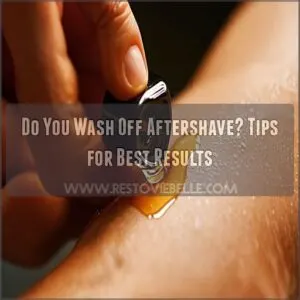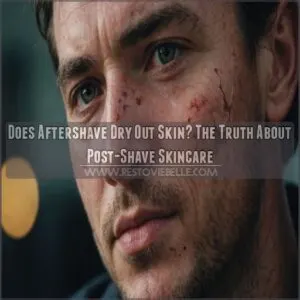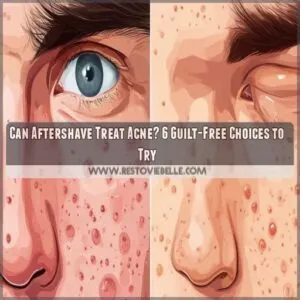This site is supported by our readers. We may earn a commission, at no cost to you, if you purchase through links.
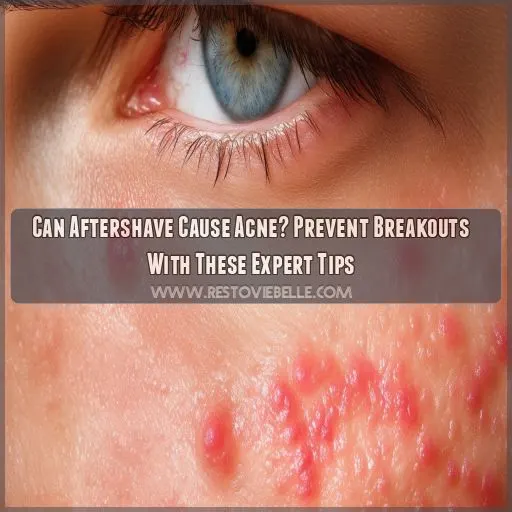
Knowing exactly how skincare affects your complexion is very important in preventing breakouts.
Table Of Contents
- Key Takeaways
- Can Aftershave Cause Acne?
- Understanding Pimple Formation
- Dealing With Aftershave-Induced Breakouts
- Balancing Aftershave Use for Skin Health
- Personalizing Your Skincare Regimen
- Frequently Asked Questions (FAQs)
- Is aftershave good against acne?
- Does aftershave cause pimples?
- How do you deal with aftershave acne?
- Is aftershave bad for your face?
- What ingredients should aftershave avoid for acne-prone skin?
- How often should you apply aftershave?
- Are alcohol-free aftershaves better for oily skin?
- Can aftershave replace an acne treatment routine?
- Does aftershave expiration affect its efficacy?
- Conclusion
Key Takeaways
- You may experience neck pain due to acne after shaving, but avoid aftershaves that contain pore-clogging or irritating ingredients that disrupt your skin’s balance. Cocoa butter and fragrances are not your friends, whereas witch hazel and tea tree oil are!
- Witch hazel and tea tree oil are excellent alternatives to harsh alcohol, offering both antiseptic and soothing benefits. These natural ingredients can help keep your skin clear without causing irritation.
- If you’re experiencing breakouts like a teenager after shaving, check your aftershave for pore-clogging ingredients such as cocoa butter or isopropyl palmitate. These can trap bacteria and oil, making acne worse.
- Dealing with aftershave-induced breakouts? Aloe vera and chamomile act as a soothing balm for your skin, reducing sensitivity and irritation. Tea tree oil is another great option, as it’s known for its antibacterial effects and can help keep breakouts at bay.
Can Aftershave Cause Acne?
Aftershave can potentially cause acne if it contains pore-clogging or irritating ingredients that disrupt your skin’s balance. You’ll want to avoid ingredients like cocoa butter and fragrances, while looking for antiseptic components such as witch hazel or tea tree oil that can help prevent breakouts.
Impact of Pore-Clogging Ingredients
Your aftershave selection can impact acne-prone skin. Certain ingredients in aftershaves may clog pores, leading to breakouts. Be ingredient-aware when choosing products.
Cocoa butter, isopropyl isostearate, and linseed oil are common culprits. These can trap bacteria and oil, exacerbating acne.
To prevent pimples, opt for non-comedogenic formulas.
Irritating Ingredients to Avoid
When choosing an aftershave, you’ll want to steer clear of irritating ingredients that can trigger acne. Here are three culprits to watch out for:
- Alcohol: It’s harsh and drying, potentially leading to excess oil production.
- Fragrances: These can irritate sensitive skin and clog pores.
- Sulphates: They strip your skin’s natural oils, causing irritation.
Instead, opt for natural ingredients like witch hazel or aloe vera to soothe your skin post-shave.
Role of Antiseptic Ingredients
While avoiding irritating ingredients is crucial, antiseptic components in aftershave play a vital role. They disinfect nicks and cuts, preventing infection.
Witch hazel and tea tree oil are excellent alternatives to harsh alcohol, offering both antiseptic and soothing benefits. These natural ingredients can help keep your skin clear without causing irritation.
Understanding Pimple Formation
Understanding how pimples form is crucial to grasp the link between aftershave and acne. Your skin’s reaction to certain ingredients in aftershave products can trigger or worsen pimple formation, making it essential to choose suitable formulations for your skin type.
Connection Between Aftershave and Pimples
You’re probably wondering how aftershave has to do with these annoying pimples. The thing is, it’s not really the product but how you use it. Here’s what you need to know:
- It’s all in the aftershave application technique
- The sensitivity of your skin is the most important consideration
- Shaving method may influence acne formation
You can experiment with products to find out what really works for you. Note that natural aftershaves are milder and much easier on acne-prone skin. Never worry, and follow the right steps so you’ll get this smooth shave without worrying about starting up those breakouts.
Factors Contributing to Acne
While aftershave can contribute to acne, it’s not the only culprit. Your skin’s health is influenced by various factors. Let’s break down the key players in pimple formation:
| Factor | Impact on Acne |
|---|---|
| Hormones | Trigger excess oil production |
| Diet | Certain foods may worsen breakouts |
| Stress | Increases inflammation and oil |
| Sleep | Poor quality affects skin repair |
| Sun | Can irritate and inflame skin |
Understanding these factors helps you take control of your skin care journey.
Importance of Choosing Suitable Ingredients
Knowing what ingredients to go for in aftershave will spare you acne.
One should avoid any that have pore-clogging ingredients like cocoa butter or isopropyl palmitate.
It might be a good idea to include antiseptic ingredients like witch hazel or tea tree oil in your aftershave. These are two antiseptics that clean the skin well.
Likewise, aloe vera should help soothe irritation and lower the potential for breakouts.
What goes on your skin is what counts!
Dealing With Aftershave-Induced Breakouts
To prevent aftershave-induced breakouts, choose aftershaves free of pore-clogging and irritating ingredients, and focus on products with natural, soothing ingredients like aloe and chamomile. Implement steps like using clean blades, gentle shaving techniques, and proper skincare routines to minimize skin irritation and reduce the risk of acne.
Tips for Preventing Acne
To prevent acne after using aftershave, focus on your shaving frequency and aftershave application. Don’t overdo it; shave only as needed to avoid excessive irritation. Apply aftershave sparingly and evenly, choosing non-comedogenic products. Opt for natural, soothing ingredients like chamomile or tea tree oil to minimize breakouts. Incorporate these tips into your routine for clearer skin.
Steps to Minimize Skin Irritation
To minimize skin irritation from aftershave, start by ensuring your razor blades are clean and well-maintained. Use gentle, short strokes when shaving, and consider cutting your facial hair before shaving to reduce irritation. Opt for natural, non-comedogenic ingredients like witch hazel and tea tree oil, which can disinfect and soothe the skin without clogging pores.
Natural Soothing Ingredients to Consider
For calming aftershave-induced breakouts, consider natural alternatives with anti-inflammatory ingredients like chamomile, aloe vera, and witch hazel. These soothing properties help reduce skin sensitivity and irritation. Tea tree oil, known for its antibacterial effects, is another excellent option for soothing troubled skin, promoting healing, and reducing inflammation while keeping breakouts at bay.
Balancing Aftershave Use for Skin Health
Use the aftershave in a balanced manner because it may be hazardous to skin health, particularly if one has acne-prone skin. Weigh the pros and cons of aftershaves against safety for acne-prone skin and tailor your routine accordingly to hold acne at bay.
Benefits and Drawbacks of Aftershaves
Aftershaves do a lot of things: they calm irritation, disinfect cuts, and close pores up against acne.
Nevertheless, the ingredients that include alcohol and menthol might irritate, while the oils will clog the pores.
Getting the right product with non-irritant and non-comedogenic ingredients like witch hazel and tea tree oil can really help in balancing benefits against drawbacks for optimal skin health.
Safety Considerations for Acne-Prone Skin
The right aftershave would depend on whether you seek anti-acne effects. Tell them to keep a watch on the mineral oil that clogs pores and irritants like alcohol.
Then, choose products with antiseptic benefits such as tea tree oil and witch hazel, which disinfects without over-drying. Equally important are soothing ingredients like aloe and chamomile that reduce irritation and maintain fortress-like skin.
Customizing Aftershave Routine for Acne Management
Balancing aftershave use for skin health requires careful selection, especially with acne-prone skin. Analyze ingredients and avoid irritants like alcohol. Opt for natural alternatives such as witch hazel or tea tree oil. Experiment with different products, keeping your skin sensitivity in mind. Customize your routine by documenting what works best, and don’t hesitate to consult a dermatologist.
Personalizing Your Skincare Regimen
To maintain healthy skin, consider your skin type and the ingredients in your aftershave. It often takes trial and error to find the right products, so consulting a dermatologist can be beneficial.
Skin Type Considerations
Knowing your skin type is the first step toward choosing the best aftershave for you. For oily skin, you want non-comedogenic, oil-free formulas.
If you’re having dry skin, then it’s all about moisturizing ingredients. Try using something that won’t be as irritating if you have sensitive skin—something gentle and fragrance-free.
You can try a few of the products out there to see how your skin responds. If you’re still dealing with a lot of acne or irritation, consult a dermatologist.
Trial-and-Error Approach for Finding Suitable Products
Finding the right aftershave can feel like a science experiment. Test different products to observe how your skin reacts to various ingredients. Monitor for any irritation or acne flare-ups. Everyone’s skin is unique; what works for one person mightn’t work for you. Prioritize products that align with your skin’s needs, personal preferences, and desired individual results.
Consulting a Dermatologist for Acne Concerns
After trying the trial-and-error approach to find the right products, it would be very good to consult a dermatologist. They’ll be able to look at your skin type and advise on the ingredients in aftershave and what would be best for your skin.
Making sure you’re not subconsciously worsening acne or irritation gives peace of mind. Having a clear, actionable plan for how to apply aftershave effectively.
Frequently Asked Questions (FAQs)
Is aftershave good against acne?
Aftershave, especially those with soothing ingredients like witch hazel or tea tree oil, can help with acne by disinfecting nicks and calming irritation. However, avoid alcohol-based ones, as they can dry out and irritate your skin.
Does aftershave cause pimples?
Aftershave can cause pimples, especially if it contains alcohol or pore-clogging ingredients like fragrances or oils. Opt for soothing, non-comedogenic options like aloe, witch hazel, or tea tree oil to minimize breakouts.
How do you deal with aftershave acne?
To deal with aftershave acne, use gentle, non-comedogenic products. Opt for soothing ingredients like aloe vera and witch hazel to calm irritation. Avoid harsh chemicals and fragrances that can further aggravate your skin.
Is aftershave bad for your face?
You might be opening Pandora’s box if you use alcohol-based aftershaves; they dry out your skin and can cause irritation. Opt for aftershaves with soothing ingredients like witch hazel or aloe to avoid potential skin issues.
What ingredients should aftershave avoid for acne-prone skin?
For acne-prone skin, avoid aftershave ingredients like palmitic acid, sulphates, oleyl alcohol, butyl stearate, menthol, cocoa butter, isopropyl isostearate, isopropyl palmitate, linseed oil, octyl palmitate, sweet almond oil, and fragrances.
How often should you apply aftershave?
Carefully consider the cadence of your aftershave application. Consistent, cautious use – twice daily, morning and night – can soothe sensitive skin and stave off unsightly acne. Moderation is key for your mug’s well-being.
Are alcohol-free aftershaves better for oily skin?
Yes, alcohol-free aftershaves are better for oily skin. They reduce the risk of drying out your skin, which can increase oil production, and they avoid the irritation that alcohol-based products can cause.
Can aftershave replace an acne treatment routine?
Aftershave can’t replace an acne treatment routine. While it can soothe skin and disinfect minor cuts, it lacks targeted acne-fighting ingredients. You need specific treatments for effective acne control and prevention.
Does aftershave expiration affect its efficacy?
While aftershave’s expiration may impact its potency, the real concern is whether it suits your skin type. Opt for gentle, non-comedogenic formulas to avoid clogging pores and exacerbating acne. Consult a dermatologist to find the right aftershave for your needs.
Conclusion
Adopt smart skincare strategies, such as choosing the right products for aftershave use, to prevent those pesky pimples.
Can aftershave cause acne? Absolutely. If you don’t choose the ingredients correctly, then non-comedogenic gentle aftershaves and avoiding irritating substances in the formula can be very helpful for acne-prone skin.
Balancing aftershave use is important; however, when considering your skin type, tailoring your regimen really makes a huge difference in reducing breakouts.
Always, if in doubt, consult with a dermatologist for advice on the best care for your complexion.

